9th Nov 2022
Hi, I’m Sam Attard, founder of Ethical Revolution. I also spent 3 years as manager of the UK’s first ever high street sharing shop (Library of Things). I’ll tell you about both of them below but first here are my own origins:
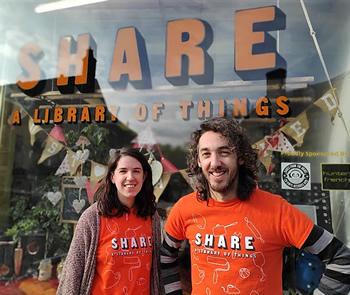 Born in the early ‘80s to an artist mother and entrepreneur father I have always been heavily in to music (playing, listening and dancing!) and sport (football, cricket and snooker being my top 3!)
Born in the early ‘80s to an artist mother and entrepreneur father I have always been heavily in to music (playing, listening and dancing!) and sport (football, cricket and snooker being my top 3!)
I got to a decent level playing cricket at county level until serious injury as a 19 year old curtailed that career. I had just returned from a gap year playing cricket in Australia when it happened. I had already enrolled at Cardiff University specifically to enter their cricketing centre of excellence and it was only a few weeks before starting that cricket had to stop. I was left to go and study a course I had chosen merely as a side note to the cricket: Communication.
Whilst at university I worked on an events team, looking after various musicians from The Darkness to Sugababes and Anthrax to Ice-T. The highlight for me was a 2 month stint as PA to Super Furry Animals. They had been my favourite band as a young teenager so this was a dream come true. After the course finished I continued in this line of work until the injury had become so bad that I could no longer walk. Signed off whilst on waiting lists I finally got an operation which gave me the bionic hip I have today!
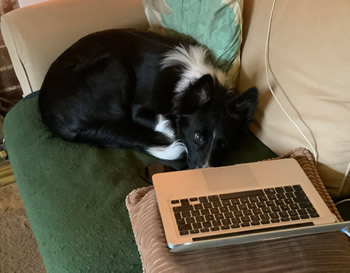 During the downtime I’d moved back home with my folks. I drew on some of the publishing skills I’d gained from my course and got some heads together in my hometown of Cheltenham to try to revive a previously rife music scene using an arts magazine as the vehicle. We had tried to revive the old arts centre in the process, an endeavour which ultimately failed, although the buzz around the magazine did create a fantastic little scene in the mid-noughties. It was for the magazine that I built my first website and when the magazine came to an end a couple of people asked me to make websites for them. From that point on I became a web developer. Fast forward to 2013 and Ethical Revolution was born.
During the downtime I’d moved back home with my folks. I drew on some of the publishing skills I’d gained from my course and got some heads together in my hometown of Cheltenham to try to revive a previously rife music scene using an arts magazine as the vehicle. We had tried to revive the old arts centre in the process, an endeavour which ultimately failed, although the buzz around the magazine did create a fantastic little scene in the mid-noughties. It was for the magazine that I built my first website and when the magazine came to an end a couple of people asked me to make websites for them. From that point on I became a web developer. Fast forward to 2013 and Ethical Revolution was born.
Without the help of my PA, Ted, I'd never get through my daily emails!
Something people find strange about me is that I don’t own a mobile phone. It happened by accident. My phone broke in 2012 while I was living in Spain. By not immediately finding a replacement I realised what a difference it made to my life. Pure bliss! I decided to keep going without one and the more time goes on the more I’m adamant I won’t get one.
Ethical Revolution shares steps that anyone can take to help contribute towards a more sustainable future. Understanding that from a consumer point of view the more sustainable options can often be more expensive, Ethical Revolution teams up with ethical companies to offer exclusive discounts and coupon codes on various such products & services to help you consume consciously for less.

There is also an Ethical Directory on the website to help connect you with ethically-minded brands, plus a whole host of pages dedicated to alternative methods of interacting as a consumer to help contribute to a positive future. One such example is the Amazon Alternatives page which includes an Ethical Bookseller Search Tool - Use it to search a myriad of more-ethical booksellers than Amazon in one click. Spoiler Alert: The cheapest result is usually as cheap or cheaper than Amazon anyway!
Ethical Revolution first came about in 2013 when I made a concerted effort to shop more ethically. I soon found this didn’t come cheap, quite the opposite. I began searching for ways to save money, finding the odd discount code here or there, but it was a long drawn out process finding them in the first place. I realised I could share my findings and Ethical Revolution was born as the world’s first ethical discounts site. It’s evolved since then but the discounts section still remains, with plenty of coupon codes and offers available from sustainable goods and services.
A Library of Things works like a normal library: you sign up as a member and borrow items you need. It can be tents and camping gear, disco items, DIY and gardening tools and machinery, household and kitchen items … the list keeps going. By borrowing instead of buying people save money with those who wouldn’t ordinarily be able to afford certain items getting easy access (think of a projector for a film night, a gazebo for a garden party or a thermal imaging camera to help find less well insulated places in your home); the environmental impact is huge with literally tons and tons saved on greenhouse gas emissions, raw material usage and manufacturing use by sharing instead of owning; people save space in their homes; a community connection is forged, giving people a sense of belonging and pride in what they’re achieving together.
For three years, alongside Ethical Revolution, I became manager of SHARE:Frome - the UK’s first ever high street Library of Things. An inspirational lady named Anna Francis saw a similar project in Berlin and brought the idea back to ol’ Blighty, handing it over to Edventure who inspire young adults in to meaningful ventures by setting them loose on such projects. After launch it was handed over to members of the community to run. A few years down the line the project was on the verge of collapse. It had always relied heavily on Edventure to fund it, something they could no longer afford to do. That’s when I took over. I’m proud to say I helped steer it on a road to prosperity, converting it from a neglected arm of an umbrella company to a standalone charity that was financially self-sufficient. In doing so it became a beacon for other such sharing libraries around the country and, alongside my friends at Oxford Library of Things and Crystal Palace Library of Things, we created a UK network for sharing. Within that network there are now dozens of thriving sharing libraries up and down the country.
Ethical Revolution on Social Media:
Mastodon: @climatejustice@ethicalrevolution (It’s better than Twitter: @ethicaluton)
Pixelfed: @ethicalrev (It’s better than Instagram: @ethicalrevolution)
Diaspora: @ethicalrevolution (It’s better than Facebook!)
6th Sep 2022
Our next client origin story comes from Caitlin Job, translator and copywriter. I love how Caitlin aligned skills and interest and took further qualifications to nurture a particular aspect of the work to set up a specialist and rounded, ethical business. It's really interesting to learn more about professional translation and what that entails too.
 Hi, I’m Caitlin Job. I translate French online and print content into English. I also write blog posts, newsletters, website copy and more in English for sustainable and ethical businesses.
Hi, I’m Caitlin Job. I translate French online and print content into English. I also write blog posts, newsletters, website copy and more in English for sustainable and ethical businesses.
When people learn what I do, they often ask about translation (much more so than copywriting), so to start off, here are a few signposts to help you navigate the industry:
Now onto me and my business. My freelance journey started when I moved back to the UK from France, where I had been working in-house as a translator.
I fell into freelancing because there aren’t many in-house translation positions in the UK.
I mainly specialised in marketing and tourism as that was what I’d been doing in-house, and I love learning about new places and introducing English speakers to French culture.
I’ve always been passionate about nature and the environment. I remember lovingly carrying round a dogeared copy of a DK butterfly book, eager to spot a new species.
Moving to Bristol only made me more interested in the environment and sustainability – and it has given me a slightly warped view of what a normal number of vegetarian and vegan options is on a menu!
After freelancing for a while, I started feeling uncomfortable with some of my translation work as it targeted jet-setters, which didn’t align with my own lifestyle and beliefs.
When lockdown hit, travel and tourism translations dried up overnight. I decided to use the extra time to take a step back and evaluate my business.
Aligning my specialisms with my personal interests seemed like a no-brainer if I wanted to do my bit to make a difference.
I had also done some copywriting projects while working as a translator and enjoyed being able to create my own content rather than using other people’s words, so I took the College of Media & Publishing’s copywriting course and graduated with a distinction.
That makes it sound like I was incredibly productive during lockdown, but I binged my fair share of TV and baked countless cakes too. I just didn’t have much work or any kids.
Since then, my business has focused on helping purpose-led companies.
As a translator, I enable ethical French brands to market themselves in the UK. I also translate tourism texts for organisations championing a sustainable tourism ethos and content related to sustainable building, from smart cities to off-site construction.
As a copywriter, I write copy that clearly explains what makes a company and its products/services great, rather than the usual marketing focused on urgently buy, buy, buying.
I believe transparency is the key to earning customer trust. And it can help combat greenwashing (when companies make out that they’re more sustainable than they are).
I particularly love making complex ideas accessible. Often solutions to the climate crisis are complicated, and people need to be able to understand them if they’re going to become widespread.
I currently do more translation than copywriting, but I’d like to have a more even split in the future. I’m planning to donate a proportion of my profits to an environmental charity or tree planting campaign, but I still have some research to do to find the right one.
Like all businesses, mine is a work in progress. But as a firm believer in transparency, I share the steps I’m taking to reduce my impact as a business owner in a social responsibility charter on my website, including using Green Hosting!
Website: caitlinjob.com
LinkedIn: linkedin.com/in/caitlinjob
Twitter: twitter.com/CaitlinJob
3rd Aug 2022
This time our client origin story comes from Michael, founder of Elmbridge Community Eco Hub. This story really does show the power of community in difficult times. We also love that Michael was inspired by a fellow Green Hosting client when he was brewing up the idea of the hub. Here's the full story in Michael's own words...
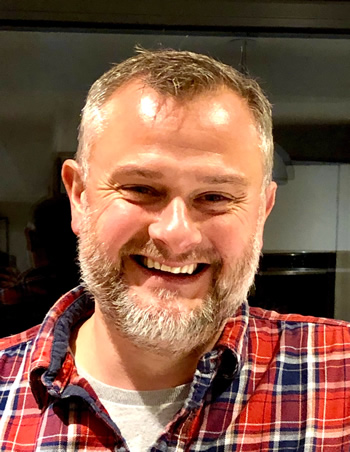 In 2019 whist recovering from a cycling accident, I started to formulate an idea of creating a community/environmental project in the town I have lived in for almost 20 years (Walton-on-Thames, in Surrey, UK). The trigger was “fired” whilst watching an episode of BBC’s CountryFile, where they highlighted the work being done by ShareFrome, in creating a Library of Things in the Somerset town. Basically it was a retail unit that offered everyday household items, gardening tools, musical instruments, toys and games and power tools for the community to borrow in return for a small fee/donation, saving these items from going to waste sitting in a garden shed, a cupboard under the stairs or in an attic gathering dust. The benefits include saving people money as they can borrow items for a short term and not have to part with a potential huge initial outlay. It also helps the environment as it reduces reliance on manufacturing lots of new items, shipping them across the world, not to mention the mining and drilling for the raw materials used to make them in the first place. I loved the idea and started to wonder if this was something we could benefit from in our area.
In 2019 whist recovering from a cycling accident, I started to formulate an idea of creating a community/environmental project in the town I have lived in for almost 20 years (Walton-on-Thames, in Surrey, UK). The trigger was “fired” whilst watching an episode of BBC’s CountryFile, where they highlighted the work being done by ShareFrome, in creating a Library of Things in the Somerset town. Basically it was a retail unit that offered everyday household items, gardening tools, musical instruments, toys and games and power tools for the community to borrow in return for a small fee/donation, saving these items from going to waste sitting in a garden shed, a cupboard under the stairs or in an attic gathering dust. The benefits include saving people money as they can borrow items for a short term and not have to part with a potential huge initial outlay. It also helps the environment as it reduces reliance on manufacturing lots of new items, shipping them across the world, not to mention the mining and drilling for the raw materials used to make them in the first place. I loved the idea and started to wonder if this was something we could benefit from in our area.
During my research into the Library of Things concept, I started to discover other projects that I thought could also benefit our community. For example, Community Fridge, plastic free refill, community run small item recycle collection points and book swap. The challenge then was determining if I had the willpower, determination, time and energy to try to bring these to Walton, whether the community wanted them, how I could perhaps make this happen all the while trying to balance family life with my wife and fellow Eco Hub Director Deb, and our 3 teenage children – Dillon, Harry and Megan. After a few months mulling things over and discussing it with family and friends, I decided to give it a go. I was approached by a couple of people who had time to help and we started formulating an organisation, creating a brand, and looking for potential venues that could host all of the initiatives under 1 roof – A physical Hub, for as little money as possible - as we had NONE!
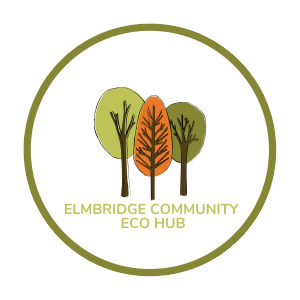 By the time January 2020 came around, we had a business plan, a constitution, a bank account, were registered as a not for profit Community Interest Company and had viewed a potentially very suitable and affordable venue. Very exciting times. Of course then the global Covid pandemic hit the world and everyone’s lives were put on hold for many months.
By the time January 2020 came around, we had a business plan, a constitution, a bank account, were registered as a not for profit Community Interest Company and had viewed a potentially very suitable and affordable venue. Very exciting times. Of course then the global Covid pandemic hit the world and everyone’s lives were put on hold for many months.
Roll on to October 2021. Some people - who are now lifelong friends left the project due to work and family commitments and were succeeded by others. Indeed the team grew from 4 to 8 people, all coming from various backgrounds – medicine, market research, social work, occupational health, gardening, accounting, media and home making.
Due to unforeseen circumstances, advanced and prolonged discussions with the local council for taking on a lease on a local empty property sadly fell through at the very last minute. Thankfully the council really liked the idea of the Eco Hub and following a brainstorm session offered us a 3 year peppercorn lease on a former bowling green and associated club house (an approximately 200 year old former stable block to a local Manor House). The site had been abandoned approximately 8 years and was in terrible shape. The green – approximately ¼ acre in size, was wild, often accessed by local kids at the weekends and covered with broken glass, rubble and rubbish. Access to the building itself was inhibited as it was totally overgrown with Buddleia, so much so it took almost a month of clearing before we could actually get in! With no insulation, hot water or heating, it was surprising to see that it was at least watertight and free from damp.
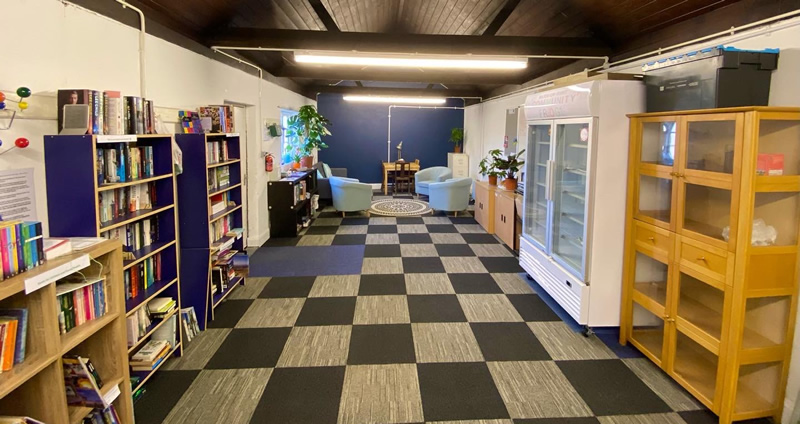
The fantastic people of Walton-on-Thames rallied round and helped completely clear the site, clean and decorate the building, raise funds and awareness all with the aim of bringing the Elmbridge Community Eco Hub to life. However, 6 weeks after receiving the keys, the building was sadly broken into leaving windows broken, security lighting smashed, the heating, Wi-Fi and TV stolen, and the place generally trashed. Clearly this was devastating to everyone involved, but within hours, the community had yet again rallied round, helped to clean up and make repairs, raised funds to replace heating, and install a comprehensive security system.
6 months on and the Elmbridge Community Eco Hub is thriving, some would say it’s become an essential part of our community. We host the Library of Things, Community Fridge, a Community Garden, Small item recycling, plastic free refill, book, boardgame and jigsaw swap, a seed bank, run community litter picking events and we are about to initiate a skill share initiative.
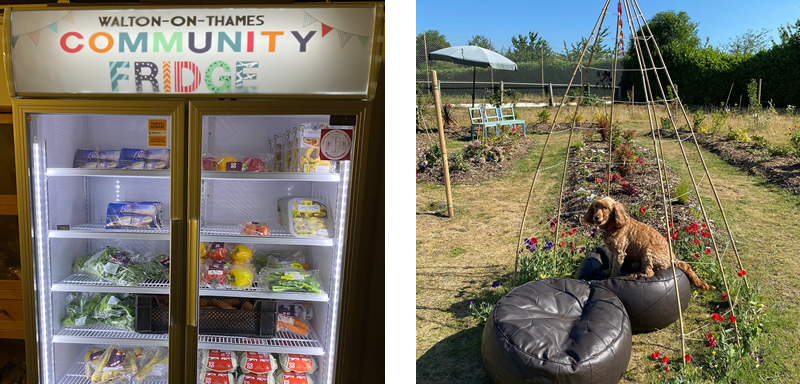
We finally opened to the public on Valentine’s Day (February 14th) 2022 and have since had approx 3500 visitors, have redistributed almost 3 tonnes of surplus food, 500 books, are nearing our 100th loan in the Library of Things. We have created a really beautiful community garden comprising an allotment area, sensory garden and wildflower meadow with 2 ponds to encourage wildlife and biodiversity. To support all this we have 35 regular volunteers, 200+ “drop in volunteers” and 16 Duke of Edinburgh bronze, silver, gold young people volunteering. We also host regular visits from schools, colleges, beavers, cubs, scouts, brownie groups, special needs groups and other volunteer groups, host corporate days and generally encourage inclusivity and community cohesion. All this and were still only 5 months old! Based on this start the future is very promising, if perhaps hopefully a little less hectic and emotional!!
Find Elbridge Eco Hub online:
elmbridgeecohub.org.uk
Instagram: @elmbridge_eco_hub
Twitter: @Elmbridgeecohub
13th Jul 2022
Our latest Client Origin Story comes from Rebecca of Conscious Skincare. The great thing about this story is that this business was in the pipeline for Rebecca from a young age. Find out how it came into being and the success it is today. Over to you Rebecca...
9 ½ out of 10. This was the score from my biology homework when I was 13. The topic was ‘The Skin’ and the homework was to create a skincare routine for a teenager.
From an early age, I always wanted to run my own business. I always loved experimenting, especially if I could see a way I could improve things. The perfect opportunity came along when me and my husband moved to the west coast of Wales. Soon after we moved in, however, my husband was poisoned by a well known weed killer and became instantly sensitive to everything so I scrabbled through my notes and recipes and made up some products he could use safely. And so, Conscious Skincare was born!

I had already started ‘tinkering’ with skincare recipes with an ‘Ooh what if I did that?’ curiosity at every turn. Now, over 10 years later, we’re blown away sometimes by how much our customers love our products, our ethos and equally by their loyalty and support; we’re humbled by it in fact. It also affirms to us that we’re doing the right things, the right way. This was never about a ‘get rich’ scheme for us, or to turn Conscious Skincare into some multi national faceless corporation. It was, and still is about making the best natural skincare products we can with the best organic ingredients and being close enough to these precious ingredients and the process to know their providence and integrity, rather than our products being massed produced god knows how, god knows where then shipped half way around the world. And at what true cost?
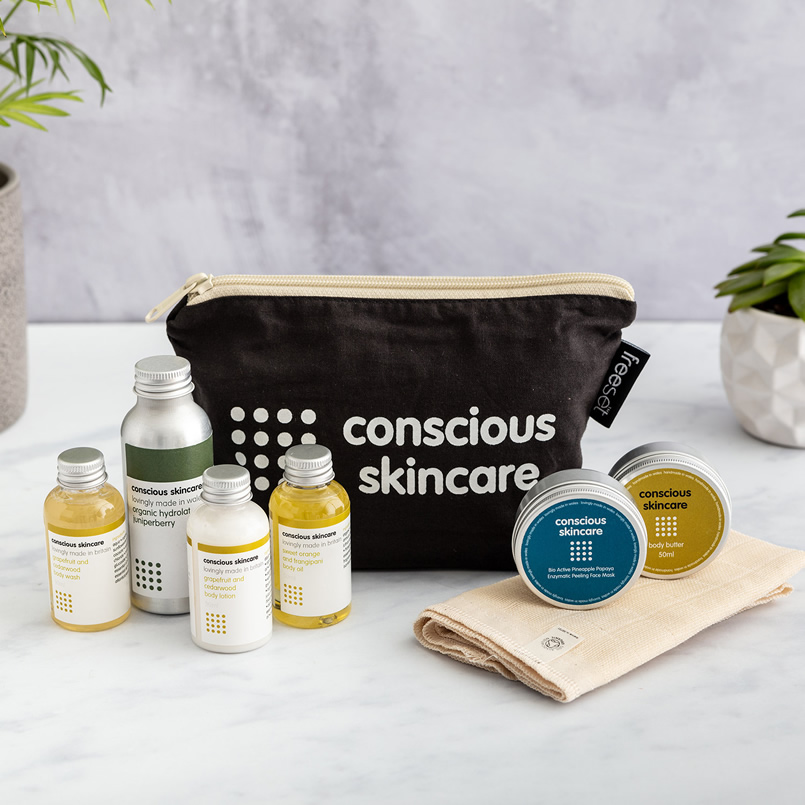
Who knew we’d reach the point when we were sitting at our dining room table in 2012, hand labelling 1800 products for a boutique, Cotswold hotel contract we’d won, with boxes piled high all around us? We hand labelled all those products with a ‘Heath Robinson’ gadget my father-in-law crafted from wood so we could rest the bottle on a cradle and line up the label so it would apply neatly and straight to look their best in the beautiful hotel bathrooms.
And so here we are, in our 11th year, still maintaining our founding principles, not being swayed or lured onto the ‘dark side’. We will always be cruelty free, no palm oil, no hideous 26 letter, unpronounceable preservatives in our products which continue to be lovingly made by us and our fabulous team here on the west coast of Wales.
Rebecca & Quentin, Founders
Find out more at conscious-skincare.com
Twitter: @consciousface
Facebook: @Conscious-Skincare
Instagram: @conscious_skincare
21st Jun 2022
Next up in our client origin stories is the Wildlife Garden Project founded by Laura Turner. What I love about this story is how it shows that something wonderful can be created from a desire to make a difference, finding something you love and applying your skills to it. Such a positive story for the start of the summer and at a time when we can all take Laura's lead and do more for wildlife. Over to you Laura...
 Hello! I’m Laura. Before I started the Wildlife Garden Project back in 2010, I was completely new to the idea of wildlife gardening. I was working as a freelance videographer making videos for small local businesses. I was loving my job, but becoming increasingly concerned with the growing problems facing our planet. I wanted to do my bit in some small way, so I started looking for a conservation based project I could work on in my spare time.
Hello! I’m Laura. Before I started the Wildlife Garden Project back in 2010, I was completely new to the idea of wildlife gardening. I was working as a freelance videographer making videos for small local businesses. I was loving my job, but becoming increasingly concerned with the growing problems facing our planet. I wanted to do my bit in some small way, so I started looking for a conservation based project I could work on in my spare time.
At the time, I had just started renting my first house with a small garden and I began researching things I could do to attract wildlife. The concept of wildlife gardening appealed to me straight away – this was somewhere where I, as an individual, could make a difference to help conserve the struggling wildlife in my local patch. Wildlife gardening wasn’t a new concept, but it was far less known about than it is today, and so I started forming a plan to inspire others to make these small but important changes in their gardens.
I believe film is one of the most powerful mediums we have to communicate important messages, and so I decided it was the perfect way to demonstrate how to garden for wildlife. With little to no knowledge myself, I gathered a team of experts and volunteers to help make tutorial videos on everything from building a bird box to growing a wildflower meadow. With the help of my little brother Michael, we built a website to house the videos as well as lots of articles, tips and advice to help people create their own wildlife gardens.

 In 2014, I started my own company, Fuzzfox, making videos for charities and local businesses. This tied in perfectly with the Wildlife Garden Project. Not only did it mean I had the equipment and skills to make tutorial videos, but importantly, it paid my bills whilst I devoted my spare time to the Wildlife Garden Project.
In 2014, I started my own company, Fuzzfox, making videos for charities and local businesses. This tied in perfectly with the Wildlife Garden Project. Not only did it mean I had the equipment and skills to make tutorial videos, but importantly, it paid my bills whilst I devoted my spare time to the Wildlife Garden Project.
In the 12 years since forming, I’ve learnt so much from my work on the project, as well as gaining knowledge shared by all the experts who so kindly dedicated their time and experience to help make videos and write articles for the website. A few years ago, I managed to buy my first house with a garden which I have been slowly but surely transforming into a haven for wildlife. Finally having my own patch means that I’ve been able to put more of the techniques I’d learnt into practice and I now get visited by a huge array of birds, insects and mammals, including badgers! I’ve even dug a small pond which the gang of sparrows that hang out in my hedges love to bathe in.
In 2019, I was lucky enough to acquire a stand at Birdfair, the UK’s biggest wildlife festival (nicknamed the wildlife Glastonbury!). A few weeks before the event I had a phone call from a wonderful woman called Tina. She’d found us on the Birdfair website and saw that we were new to the event. She asked me, ‘Would it be ok if I bring Chris Packham to your stand to do a book signing?’ After much screaming and excitement, I gave her a huge YES. The event was amazing, we met so many wonderful people and gave wildlife gardening advice to lots of new people. Meeting Chris Packham was the icing on the cake.
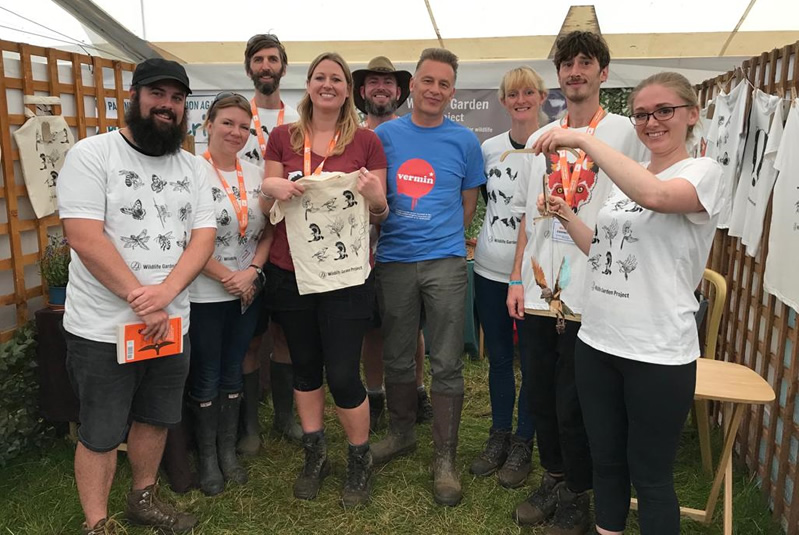
Tina and I stayed in touch, and many phone calls and fits of laughter later, we realised we shared so many of the same aspirations and decided we wanted to work together. I had been wanting to move the Project forward for a while, and so in 2021, we registered the Wildlife Garden Project as a Community Interest Company (CIC) along with bird and moth fanatic and expert Tom Shields.
As a not-for-profit, we are now able to apply for funding which will allow us to spread our wildlife gardening message even further. In fact, we have just secured our first lot of funding which will allow us to develop a project that Tina and I have been chatting about for over two years. Exciting times!
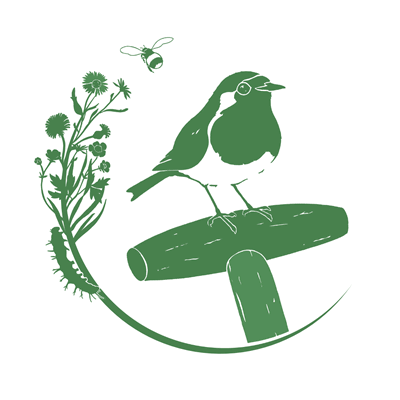 We have so many plans for the future, but at the heart of it all is to make wildlife gardening easy and accessible to everyone. We are all still working on the project in our spare time, but we hope in the future that we may be able to find a way to earn a small income from it so that we can afford to devote even more time to the cause. But for now, we have lots more videos planned, as well as the funded project which we hope to be able to announce in the coming months!
We have so many plans for the future, but at the heart of it all is to make wildlife gardening easy and accessible to everyone. We are all still working on the project in our spare time, but we hope in the future that we may be able to find a way to earn a small income from it so that we can afford to devote even more time to the cause. But for now, we have lots more videos planned, as well as the funded project which we hope to be able to announce in the coming months!
We are always looking for collaborations and so if you’d like to discuss working together, please get in touch!
Find Laura online at:
wildlifegardenproject.com
Instagram: @wildlifegardenproject
Twitter: @WildlifeGardenP
Facebook: @wildlifegardenproject
YouTube: youtube.com/user/wildlifegardenfilm
fuzzfox.com